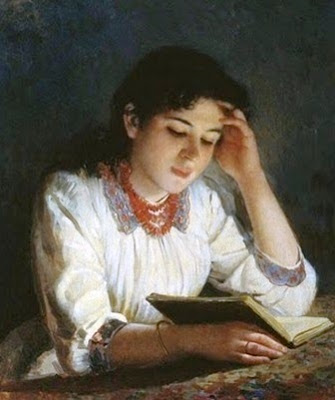It’s satisfying when science discovers something that you’ve been telling your students for years. Did you know, for instance, that literature makes you emotionally smarter? Two scholars at the New School for Social Research have conducted tests that prove it.
According to a press release from the university,
psychology Ph.D. candidate David Comer Kidd and his advisor Emanuele Castano have found that those who read great literature do better on various psychological tests than do those who read either popular fiction or non-fiction.
Their subjects took “Theory of Mind (ToM)” tests to see how well they could “mind read” the mental states of others. Kidd and Castano had their subjects take the tests after reading excerpts from recent National Book Award finalists and winners of the 2012 PEN/O. Henry Prize for short fiction; popular fiction from Amazon’s bestseller list; and articles from Smithsonian Magazine.
A New York Times blog post sums up their findings:
The researchers…found that people who read literary fiction scored better than those who read popular fiction. This was true even though, when asked, subjects said they did not enjoy literary fiction as much. Literary fiction readers also scored better than nonfiction readers — and popular fiction readers made as many mistakes as people who read nothing.
In explaining the results, the researchers sound like English teachers:
Kidd and Castano suggest that the reason for literary fiction’s impact on ToM is a direct result of the ways in which it involves the reader. Unlike popular fiction, literary fiction requires intellectual engagement and creative thought from its readers. “Features of the modern literary novel set it apart from most bestselling thrillers or romances. Through the use of […] stylistic devices, literary fiction defamiliarizes its readers,” Kidd and Castano write. “Just as in real life, the worlds of literary fiction are replete with complicated individuals whose inner lives are rarely easily discerned but warrant exploration.” (Science Now)
The New York Times article then asks some interesting follow-up questions:
There is much the study does not address: How long could such effects last? Would three months of reading Charles Dickens and Jane Austen produce larger or smaller effects, or have no impact? Are the differences in scores all attributable to the type of material read? Would the results hold if the same person read all of the types? And would it matter if the literary fiction was particularly difficult? (Nobody was asked to read James Joyce or Thomas Pynchon.)
My own (unscientific) take on these questions is that reading great literature is a bit like using a foreign language. The more one reads, the more emotionally intelligent one becomes. Relatedly, if one has read recently, one will be more alert to subtle psychological cues than if one hasn’t read for a while. The effects of reading, in other words, can atrophy over time if one doesn’t keep it up.
Incidentally, I’m not convinced that a challenging novel like Pynchon’s Gravity’s Rainbow (which I struggled through one summer) will make one emotionally smarter than Austen or Dickens. Intellectual complexity is not the same thing as emotional complexity.
Returning to the New School’s study, I liked author Louise Erdrich’s amused and partially sarcastic response when told about it by the New York Times reporter:
“This is why I love science,” Louise Erdrich, whose novel The Round House was used in one of the experiments, wrote in an e-mail. The researchers, she said, “found a way to prove true the intangible benefits of literary fiction.”
“Thank God the research didn’t find that novels increased tooth decay or blocked up your arteries,” she added.
And further on in the article:
“Writers are often lonely obsessives, especially the literary ones. It’s nice to be told what we write is of social value,” she said. “However, I would still write even if novels were useless.”
Needless to say, one doesn’t want to argue that people should read literature only because it has psychologically beneficial effects. That’s reducing it to Gradgrindian utilitarianism. On the other hand, given that the new Core Standards are requiring English teachers to teach less fiction and more essays, maybe this study can give teachers ammunition for fighting back.

2 Trackbacks
[…] fiction proving more effective than beach reading or non-fiction. (I’ve posted on that study here.) Kristof also cites Thomas Pinker’s The Better Angels of Our Nature: The Decline of Violence, […]
[…] Park will stimulate more regions of the brain that a bestselling potboiler. I wrote about this in a past blog but here again are some of the […]